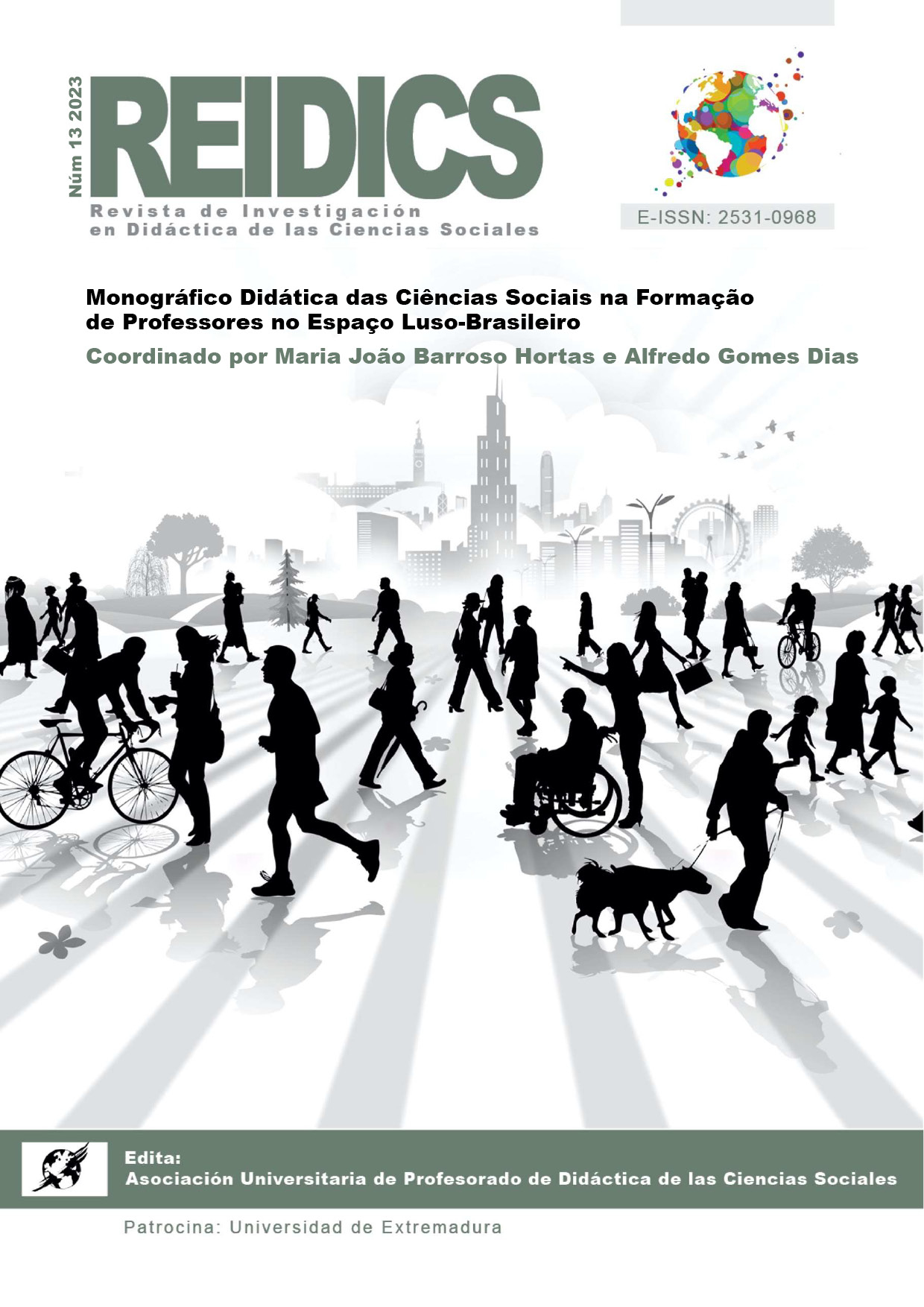Tell me what you learn, I will tell you what teacher you can be... the training of History teachers in Portugal
DOI:
https://doi.org/10.17398/2531-0968.13.02Keywords:
history teacher training; Didactics of History; external evaluation; Initial training; professionalizationAbstract
This article assumes that it is possible to know the training of History teachers from the analysis of what they learn and how they learn, in their initial training, within the scope of the master’s in History Teaching in the 3rd Cycle of Teaching Basic and in Secondary Education. Thus, from the analysis of the programs of the curricular units in the area of specific didactics and the documents related to the evaluation and accreditation process of the study cycles, we tried to outline profiles and design training paths for teaching in all higher education establishments that ensure professionalization in History.
The access to differentiated documentation as to its nature allowed the use of diversified methodologies. The analysis of the curricular units' programs resorted to the identification of key words or structuring concepts that would allow the definition of categories that would organize the main conclusions. Reading the different reports that result from the evaluation and accreditation process of the study cycles allowed a different approach: we decided to analyze the individual process of each teaching establishment, from the “zero grade” until the moment of the second accreditation.
The main conclusions point to a) the concern with training flexible history teachers, capable of adapting to current and future needs, committed to building knowledge and linking research with practice; b) the need for investment by university institutions in hiring specialized teaching staff; c) the importance of diluting the subjectivity that arises from the constitution of different teams in the evaluation of study cycles, through prior discussion of the contexts and measures to be applied, before the release of the preliminary report of the Comissão de Avaliação Externa.
References
Bardin, Laurence (1988). Análise de conteúdo. Edições 70.
Bittencourt, Circe Maria Fernandes (2003). Disciplinas Escolares: História e Pesquisa. Em M. A. T. Oliveira & S. M. F. Ranzi (Org.), História das disciplinas escolares no Brasil: contribuições para o debate (pp. 9-38). Universidade de São Francisco.
Cardoso, Oldimar (2008). Para uma definição de Didática da História. Revista Brasileira de História, 5(28), 153-170.
Chervel, André (1998). La Culture scolaire – une approche historique. Belin.
Chevallard, Yves (1991). La transposición didáctica. Del saber sabio al saber enseñado. Aique.
Cortesão, Luiza (2000). Ser professor: um ofício em risco de extinção? Reflexão sobre práticas educativas face à diversidade, no limiar do século XXI. Edições Afrontamento.
Decreto-Lei n.º 79/2014. Diário da República, 1.ª série, N.º 92, 14 de maio de 2014. [Aprova o regime jurídico da habilitação profissional para a docência na educação pré-escolar e nos ensinos básico e secundário].
Formosinho, João; Niza, Sérgio (2009). Iniciação à prática profissional nos cursos de formação inicial de profesores. Em J. Formosinho (Coord.), Formação de Professores. Aprendizagem profissional e acção docente (pp. 119-139). Porto Editora.
Gómez Carrasco, Cosme Jesús (Editor) (2023). Re-imagining the teaching of European history: promoting civic education and historical consciousness. Routledge.
Lopes, J. Bernardino (2013). Aprendizagem em Áreas de Conhecimento: as Ciências e as Tecnologias – Mediação do Professor na Aula. Em F. H. Veiga (Coord.), Psicologia da Educação. Teoria, Investigação e Aplicação (pp. 359-394). Climepsi Editores.
Martins, Guilherme d’Oliveira (Coord.) (2017). Perfil dos Alunos à Saída da Escolaridade Obrigatória. Ministério da Educação/Direção-Geral da Educação (DGE).
Macnamara, Jim (2005). Media content analysis: Its uses; benefits and best practice methodology. Asia Pacific Public Relations Journal, 6(1), 1-34.
Mialaret, Gaston (1981). A formação dos professores. Livraria Almedina.
Nóvoa, António (2009). Professores. Imagens do futuro presente. Educa.
Nóvoa, António; Alvim, Yara (2022). Escolas e Professores, proteger, transformar, valorizar. SEC/Instituto Anísio Teixeira.
Siman, Lara Mara Castro; Coelho, Araci Rodrigues (2015). O papel da mediação na construção de conceitos históricos. Educação & Realidade, 40(2), 591-612.
UNESCO (2021). Reimagining our futures together. A new social contract for education. Report from the International Commission on the Futures of Education. United Nations Educational, Scientific and Cultural Organization.
Downloads
Published
Issue
Section
License
Aquellos autores/as que tengan publicaciones con esta revista, aceptan los términos siguientes:
- Los autores/as conservarán sus derechos de autoría y garantizarán a la revista el derecho de primera publicación de su obra, el cual estará simultáneamente sujeto a la Licencia de reconocimiento de Creative Commons 4.0 BY-NC-SA que permite a terceros compartir la obra siempre que se indique su autor y su primera publicación en esta revista.
- Los autores/as podrán adoptar otros acuerdos de licencia no exclusiva de distribución de la versión de la obra publicada (p. ej.: depositarla en un archivo telemático institucional o publicarla en un volumen monográfico) siempre que se indique la publicación inicial en esta revista.
- Se permite y recomienda a los autores/as difundir su obra a través de Internet (p. ej.: en archivos telemáticos institucionales o en su página web) antes y durante el proceso de envío, lo cual puede producir intercambios interesantes y aumentar las citas de la obra publicada. (Véase El efecto del acceso abierto).
- Los autores y autoras han respetado la política de autoría de esta revista.




